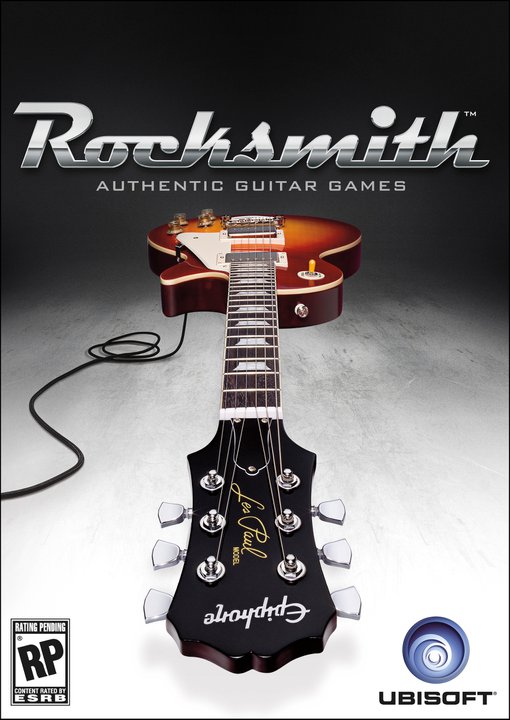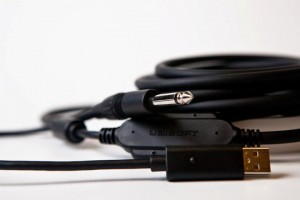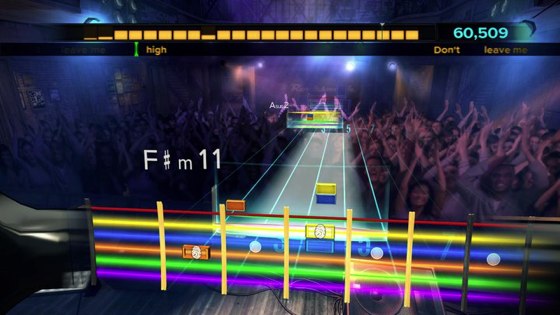
Guitar Hero and Rockband are the reason I got serious about playing the guitar again after 15 years of just occasional noodling. Playing those games with my kids was close enough to the real experience of being in a band, to remind me how much I had loved it. But the plastic button approach was different enough to be frustrating to someone who had spent a lot of time practicing a real guitar. And as my Son, who had never played a guitar, consistently blew by my mediocre scores, I wished for a game that would let me use a real guitar.
So I was understandably excited when I heard about Rocksmith. It is the first, and only game right now that lets you use an actual, real guitar. The game, currently available for PS3 and Xbox – with a PC version due in December, comes with a special cable that allows it to work with any guitar that has a standard 1/4″ output jack.

This really is Rocksmiths biggest achievement. My experience has been that it works really, really well. It accurately identifies not only single notes, but bends, hammer-ons, pulloffs, everything right up to complex sounding bar chords with all six strings ringing.
I’ve seen complaints, about Rocksmith saying a player missed a note when they were certain they had nailed it. I experienced this on a few songs as well. But when I slowed the song down in the “Riff Repeater”, I found I was the one actually making a mistake. There is also the chance that the player has a tendency to press too hard, or slightly bend certain notes, which cause them to go sharp. The intonation of the guitar could also be off, which would cause this as well. Some people claim to have corrected this by using their own tuner instead of the one built in to the game, which is admittedly by the developers, very forgiving.
Lag between when you hit the note and when you hear it from the game is a big issue. The problem is that most people run their consoles into a TV with an HDMI cable that carries the graphics and the sound. A large amount of TV’s seem to have a problem keeping these in sync as they add their own processing. Because of this Ubisoft recommends you use a set of analog cables to run the sound from your Xbox or PS3 directly to a home theater or stereo system. This is certainly an inconvenience for many, but I’ve seen many creative ways around it using guitar amps and headphones by those that don’t have a dedicated stereo for their game system. Some others say that if they switch their TV to “game” mode it corrects the problem. I guess I was just lucky, because my sound is going through my TV via an HDMI cable and the lag is negligible. But keep in mind, if you want this to work, you may need to make some changes to your setup.
The other technical achievement that the developers seem particularly proud of, is the dynamic leveling system. Essentially, this means that the game starts you out playing each song at the easiest level. Where the notes you have to play are few and far between. But you don’t have to beat the song with a certain score to level up. Instead, as you play, if the gane sees you consistently hitting all the right notes in a section, it will begin ratcheting up the difficulty right then. This is on a section by section basis though, so if your doing great in most of the song, but find one part particularly tricky, the game will remove some notes from just that section till you get it right.
I generally like this system. It’s a little disconcerting when, just as you think you have a section down, it changes. But it’s not like the whole pattern rearranges, just a few new notes are added. And if you were paying attention to the song and not mindlessly just hitting the displayed notes, you should probably be expecting them anyway. In fact, I found that the closer you got to playing every note of the song, many sections became easier. Because you start to see some of the patterns, progressions and arpeggios, and the rhythms start to feel more natural once random missing notes are filled in.
The critique by some here is that you don’t get the satisfaction of completing a level. That you are always struggling. But where’s the satisfaction in learning every other note of a song? The point is to learn the whole song.

However, the additional tools the game gives you to focus on learning the more difficult sections have some flaws. Collectively called the “Riff Repeater”, are 3 different modes where you can take a single section of a song and practice it. The first mode “Free Speed”, will stop the flow of incoming notes every time you miss one. This is the best way to learn those sections that have so many notes flying at you your not quite sure what you should be playing. However the constant stopping makes learning the rhythm nearly impossible.
The next Riff Repeater is “The Leveler”. This will first play the section at what ever difficulty you currently have mastered and will then advance to the next level whenever you play through without a mistake. And the level advances you achieve here transfer into the complete version of the song.
The last Riff Repeater is “The Accelerator”. This mode will first test your ability to play a section and use your performance to set a starting speed. For example 85%. Then, every time you play it perfectly, it increases the speed a few percentage points.
All three of these Riff Repeaters share a major flaw. Each one only gives you five “lives” to obtain perfection. They then kick you back out to the menu. The good news is that Ubisoft has heard the many, many outcries against this counterproductive limitation, and is currently working on a patch for the game to correct it.
And that brings to light Rocksmiths identity crisis. It calls itself a game, says so right on the box. But it’s really more of a teaching tool that uses some game mechanics to help make learning guitar feel like less of a chore. Even throwing in a bunch of “mini-games” that have the feel of arcade games to help drill you in various techniques. This muddled marketing is bound to sell the game to players it wasn’t really intended for. Because if you’re just looking for a casual party game and have no desire to learn to play the guitar, you will be severely disappointed by Rocksmith.
But if your one of the many people who became inspired to play the guitar by games like Rockband and Guitar Hero, this game was made for you. If you’ve been playing for a few months or a few years, but only find yourself practicing occasionally and you feel like you aren’t really progressing, Rocksmith is for you. Or if your more of an intermediate player who wants a fun way to learn new songs and get the same kind of rhythm discipline you need when playing with a band, I’d recommend this game. But if your a seasoned veteren, a gigging musician who knows most of these songs already, and has no problem quickly adding new songs to their repertoire, you may find Rocksmith a bit boring. Unless you just want to show up all those plastic buttoned wanna be rockstars.

